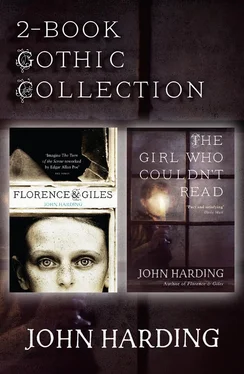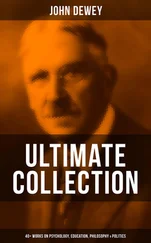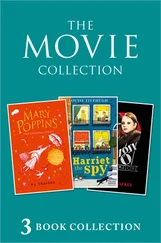No maid ever ventures here; the floors are left unbroomed, for unfootfalled as they are, what would be the point? The shelves go unfingerprinted, the wheeled ladders to the upper ones unmoved, the books upon them yearning for an opening, the whole place a dustery of disregard.
It has always been so (apart from the governessed times, of which more anon), leastways as far as I remember, for I first made my way here a third of my lifetime ago, when I was eight. We were then still ungovernessed, because Giles, who is some three years my junior, the one the teaching’s for, was considered too young for school or indeed any kind of learning, and we were hide-and-seeking one day when I opened a strange door, one that hitherto had always been locked – or so I had thought, probably on account of its stiffness, which my younger self could not manage – to refuge from him there, and discovered this great treasury of words. The game was straightway forgotten; I shelf-to-shelfed, extracting book after book, the opening of each a sneezery of dust. Of course I could not then read, yet that somehow wondered me even more, all these thousands – millions more like – of coded lines of undecipherable print. Many books were illustrated, woodcutted and colour-plated, a frustratory of captions beneath, every one of which taught me the miserable impotence of finger-tracery.
Later, after I had been scolded for going missing for so long that Mrs Grouse had everyone searching for me, not only all the maids but floury Meg and John too, I asked her if she would teach me to read. I instincted not to mention the library and it feared me quite when she gave me a quizzical look and said, ‘Now missy, what in the world has made you think of that?’
It was one of those questions it’s best not to answer, for if you keep quiet, grown-ups will always go on to something else; they lack the persistence of children. She deep-breathed in and long-sighed it out. ‘The truth is, Miss Florence, that I’m not exactly sure your uncle would want that. He has made clear to me his views on the education of young women. I think he would say that this was not the time.’
‘But please, Mrs Grouse, he wouldn’t have to know. I wouldn’t tell a soul and if he should visit unexpectedly I would hide my book behind my back and stuff it under the cushions of the chair. You could teach me in your sitting room; even the servants need not know.’
She laughed and then serioused again. She lined her brow. ‘I’m sorry, Miss Florence, I wish I could, I really do, but it’s more than my job’s worth.’ She got her mouth into a smile, something it was always ready to do. ‘But I tell you what, there’s a little housekeeping left this month, maybe enough for a new doll. Now, young lady, what say you to a new doll?’
I said yes to the doll; it was better to appear bought off, but her refusal to help me, far from discouraging me, opposited, and merely stubborned my resolve. Slowly, and with some difficulty, I taught myself to read. I lingered the kitchen and stole letters from John when he was reading the newspaper. I would point to an ‘s’ or a ‘b’ and ask him to tell me its sound. One day in the library I fortuned upon a child’s primer and from that and from here and there, I eventually broke the code.
So began the sneakery of my life. In those early days Giles and I were let wild; much of the day we could play as we liked. We had only two restrictions: one was to avoid the old well, although that was anyway covered up with planks and paving slabs too heavy for us to lift and so was just one of those things grown-ups like to worry themselves about and presented no danger to us at all; the other was to stay away from the lake, which was exceeding deep in parts, and perhaps might. How like grown-ups it is to see danger where there is none; to look for it in a lake or a well, which offer no harm in themselves without the agency of human malevolence or neglect. Yet these same cautious adults would be all unaware when the threat to us children actually came, for unlike us, for all their talk of the house being full of ghosts and ghouls, they had long ago ceased to hear unexplained footsteps in the dark.
Running apart, my brother Giles has not many talents, but one thing he is good at is keeping a secret. When I took him to the library, he little cared for the books, although he could be occupied by colour plates of birds or butterflies for an hour or two. He was happy enough scampering up and down the ladders and climbing the shelves or hiding behind the drapes, or else he would play outside; you could trust him, even at that early age, to avoid the lake, or Mrs Grouse’s prying eyes.
I, meanwhile, spent hour after hour reading, and because my absences, although unremarked during the daytime, would be noticed in the evenings, my bedroom became a smugglery of books. After Giles reached the age of eight and was sent away to school, of course, my life turned into an unheedery of anyone else. I could come and go as I liked; this part of the house was largely unvisited, and I grew so bold I scarce worried about anyone seeing me enter or leave the library, or disturbing the dust that lived there. In this way I absorbed Gibbon’s Decline and Fall , the novels of Sir Walter Scott, Jane Austen, Dickens, Trollope, George Eliot, the poetry of Longfellow, Whitman, Keats, Wordsworth and Coleridge, the stories of Edgar Allan Poe, they were all there. But one writer towered them all. Shakespeare, of course. I started with Romeo and Juliet , moved on to the histories, and soon made short work of the rest. I wept for King Lear, I feared Othello, and dreaded Macbeth; Hamlet I simply adored. The sonnets weeped me. Above all, I fell in love with the iambic pentameter, a strange passion for an eleven-year-old girl.
The thing I liked most about Shakespeare was his free and easy way with words. It seemed that if there wasn’t a word for what he wanted to say, he simply made one up. He barded the language. For making up words, he knocks any other writer dead. When I am grown and a writer myself, as I know I shall be, I intend to Shakespeare a few words of my own. I am already practising now.
It was always my greatest ambition to see Shakespeare on stage, but there is no theatre between here and New York City, hopelessing my wish. Last summer, not long before Giles was sent off to school, the people who have the estate next door, the Van Hoosiers, came calling; they had a son, Theodore, a couple of years older than me, an only child they wished to unbore. They lived in New York most of the year, travelling the hundred miles or so up here only in summer to escape the heat of the city, and the young man had no one to keep him amused and so he excited to find me. He sat and doe-eyed me all through tea.
Afterward Mrs Grouse suggested I show Theodore the lake. Now it misfortuned that Giles was ill in bed that day, confined by a severe headache. My brother is as sickly as I am well; he has illness enough for us both, while I have no time to be indisposed, having all the looking after and worrying to do. Giles’s absence now, when young Van Hoosier and I outdoorsed, gave my visitor free rein with me. He nuisanced me, obsessed as he was by my allowing him to give me a kiss. I had no fixed objection to this, being, as I was, not much younger than Juliet when she got herself romanced, but young Van Hoosier was no Romeo. He had a large head and eyes like balls that stood out from their sockets. He looked like a giant bug. Now, I am tall for my age, but Theodore was even taller, without half as much flesh; he beanpoled above me, which did not endear him to me, for I have never been one who could stand to be looked down upon.
We were side-by-siding on a stone bench beside the lake and I shifted myself to other-end from him, for I found his attentions annoying and was about ready to get up and leave, but then he let slip, no doubt at some mention of mine of Shakespeare, that he had seen Hamlet . I alerted and sat up straight and looked at him anew. Perhaps, after all, this boy might not be so unbooked as he succeeded so well in appearing; there were possibilities here, I sensed. I offered him a deal. I would allow him the kiss he so craved, if he would write a love poem for me.
Читать дальше












